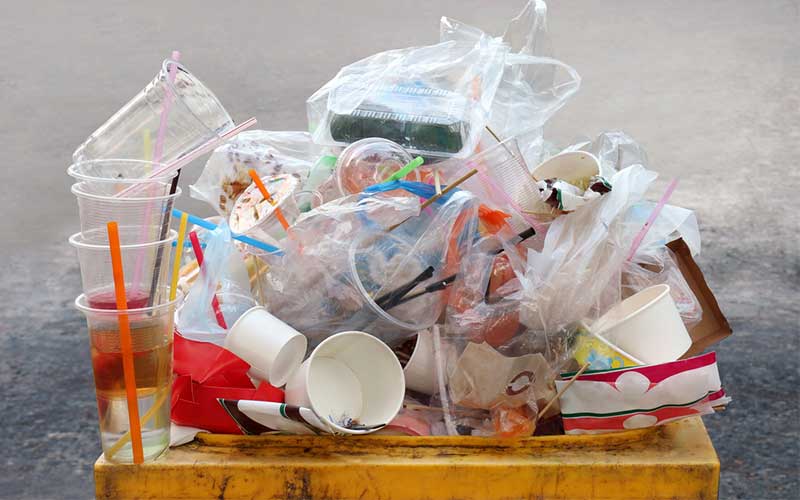
Globally, we produce more than 400 million metric tons of plastic waste each year. A global plastics treaty is an attempt to tamp down the deluge.
Two years ago, the United States and 174 other nations agreed to develop a legally binding treaty to address global plastics pollution. The deal was hailed as the most important environmental pact since the 2015 Paris Climate Agreement – because, just like the climate crisis, plastics pollution is pervasive, toxic, and requires cooperation on a global scale.
Facilitated by the United Nations Environment Program (UNEP), the global plastics treaty is set to be finalized by the end of 2024. Delegates from all over the world have been meeting to negotiate, with many countries calling for binding global rules to limit plastic production. While most countries favor binding regulations, the U.S. is pushing for a country-driven approach based on voluntary commitments. By doing so, it is losing a chance to create a truly meaningful solution for a planet awash in plastic.
As the fourth of five sessions concluded in April of 2024, the states came a step closer to drafting the final language of the treaty. But hundreds of fuel and chemicals lobbyists have continued to influence the conversation, shifting the conversation away from long-term solutions to the plastic crisis like curbing plastic production and regulating chemicals. The last session to finalize the treaty will be at the end of this year in South Korea.
A Historic Opportunity to Fix the Plastics Crisis
Globally, we produce 400 million metric tons of plastic waste each year. Plastic pollution has reached unprecedented levels during the past 15 years, with an estimated 170 trillion pieces of plastic floating like “plastic smog” on the surface of the world’s oceans. Here in New England, plastic washes up on our shores and enters our bodies. Plastic manufacturing plants and landfills and incinerators where over 90% of plastic ends up, release toxic chemicals into our air and water. These plants, landfills, and incinerators are disproportionately located in communities that already bear a high burden of environmental and health hazards.
The global plastics treaty could offer a real solution if done right. Why? Because if the world comes together, it can fix a problem. That happened with the 1987 Montreal Protocol, which established strong controls and phase-out plans for certain household chemicals depleting the Earth’s protective ozone layer.
The U.S. Must Support an Ambitious Plastics Treaty
We can – we must – do the same here. The global plastics treaty must force corporate polluters to turn off the plastics tap by limiting plastic production at its source. A “High Ambition Coalition” of 57 countries and the European Union is advocating for the treaty to be based on mandatory global targets and limits on plastic production. An ambitious treaty is especially important for environmental justice communities in New England, which are disproportionately impacted by plastic at all phases of its lifecycle.
Unfortunately, the U.S. position on the treaty is underwhelming. The U.S. has not joined the High Ambition Coalition, instead preferring a pick-and-choose approach where countries develop their own “national action plans” to address plastic pollution. But without top-down, mandatory targets, the treaty may have no real enforcement options if countries miss their deadlines. The U.S. is the world’s leading plastic polluter; we cannot allow it to sidestep its responsibility.
Recycling Will Not Solve the Plastics Crisis
Not only does the U.S. need to embrace mandatory targets, but it must move away from its emphasis on improving recycling over capping new plastic production. Although good mechanical recycling programs are essential to sustainable waste management, we cannot recycle our way out of the plastics crisis. Of the 400 million tons of plastic waste produced each year, half of that is designed to be used just once and then thrown away. From water bottles to shopping bags to food packaging, single-use plastics have taken over our lives. And recycling can’t keep up—it never has.
Nor is burning plastics to make fuel a solution to the plastics crisis, as plastic producers would have us believe. Technologies known as “chemical” or “advanced” recycling claim to create fuel from discarded plastics as part of a “climate-friendly” initiative to boost alternatives to fossil fuels. But plastic is made from the same fossil fuels causing our climate crisis. What’s more, chemical recycling facilities emit toxic chemicals that carry an astronomical cancer risk. The U.S. must not include these toxic facilities in the treaty.
Join Us in Addressing the Plastics Crisis in New England
Although the global treaty is still taking shape, there are things we can do to address plastic pollution here in New England. After all, international action must work hand-in-hand with local action. CLF’s Zero Waste Project is advocating at the state and regional level to curb the use of single-use plastics in all six New England states. Our efforts include pushing for bans on single-use plastic shopping bags, modernizing Massachusetts’s bottle bill, and banning dangerous chemical recycling facilities. With your help, we can push our legislators to adopt real, sustainable solutions to end plastic pollution once and for all.



